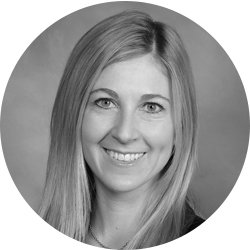supported by


Jessica Ciralsky, MD
Dr. Ciralsky is an Assistant Professor at Weill Cornell Medical College in New York.
Please share with us your background.
I received my undergraduate education at Brown University, graduating magna cum laude. I received the Anne Crosby Emery Fellowship upon graduation, an award given to two graduating seniors for scholarly ability and excellence of character. I then obtained my MD from the Johns Hopkins School of Medicine. I continued my training at the Massachusetts Eye and Ear Infirmary, Harvard Medical School, where I completed my ophthalmology residency and cornea fellowship. During my fellowship, I was elected Chief Clinical Fellow of the Cornea Service, was a recipient of the Heed Ophthalmic Foundation Fellowship, and was awarded Fellow of the Year for my contribution to resident education. I am currently an Assistant Professor of Ophthalmology at the Weill Cornell Medical College.
What is the focus of your current research?
My current research focuses on optimizing treatments for patients with advanced ocular surface diseases (Stevens-Johnson syndrome, graft-versus-host disease, chemical injuries, and mucous membrane pemphigoid). These severe diseases often lead to devastating long-term ocular sequelae. Interventions, both during the acute and chronic stages of disease, have advanced over the past several years. Treatments in the acute stages of disease with steroids, contact lenses, and amniotic membrane have shown promising results. Additionally, chronic treatments with scleral prosthetics, mucous membrane grafts, and keratoprostheses can often restore sight. My research focuses on developing new treatment strategies for these diseases to limit their potentially blinding complications.
What has your experience been collaborating with industry?
In my career, I have had some of my most meaningful experiences emerge from working with industry. Collaborations, through consulting and clinical trial work, help keep me on the cutting edge and provide my patients with the latest diagnostic and therapeutic products. Additionally, working with online publications, such as MillennialEYE, gives me the opportunity to engage young physicians and help shape the future of ophthalmology.
In your opinion, how is the role of women in ophthalmology evolving?
In 1970, women accounted for less than 10% of US physicians, whereas today women comprise almost one-third of practicing doctors. With the increasing number of women being trained in ophthalmology, the landscape is changing. Although women are still underrepresented in positions of leadership, I believe that as more women enter the field, we are going to see more women becoming professors, key lecturers, award recipients, and practice partners.
What, if any, hurdles do you feel women in health care still face?
I think achieving a work-life balance is one of the biggest challenges women face. Women often assume large roles at home as caregivers, especially when children are young. Women want to excel both at home and at work and navigating the competing responsibilities can be very difficult. I think we need to learn from female colleagues who have already successfully found a way to achieve that balance.
What advice can you offer to young female ophthalmologists who are still in training or just beginning their careers?
First, I recommend finding a mentor. I have been very lucky throughout my career to have amazing female mentors. Their guidance has been invaluable. Many female ophthalmologists have already paved the way. Learn from their journeys. Second, I would encourage young female ophthalmologists to set personal and professional goals. Once you determine your goals, you can devise a plan to achieve them. Last, I would tell young female ophthalmologists to take risks. You should apply for leadership positions, ask for a raise, accept speaking opportunities, and get involved in organizations early in your career.
Can you propose a unique or creative idea that may help women in ophthalmic practices?
I think mentorship is the key to helping women advance in ophthalmology. A mentor is often someone you meet during your medical school or residency. Unfortunately, many female residents fail to find a suitable mentor, one that they really connect with and relate to, in these traditional places. I think a mentorship program, either as part of an existing society or through a new society, would be a wonderful way to help women in ophthalmic practices. Pairing mentees with mentors who share similar paths, goals, and priorities would be invaluable.


